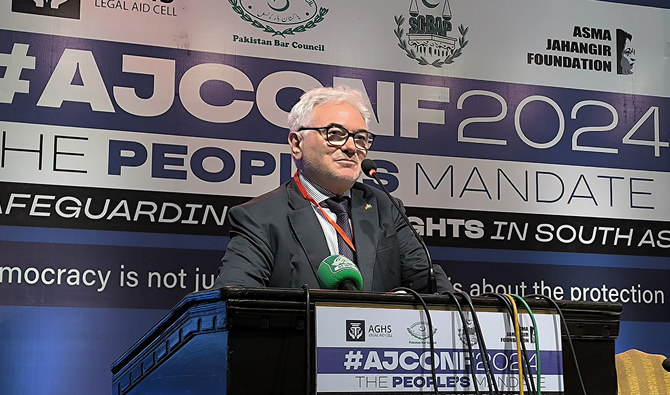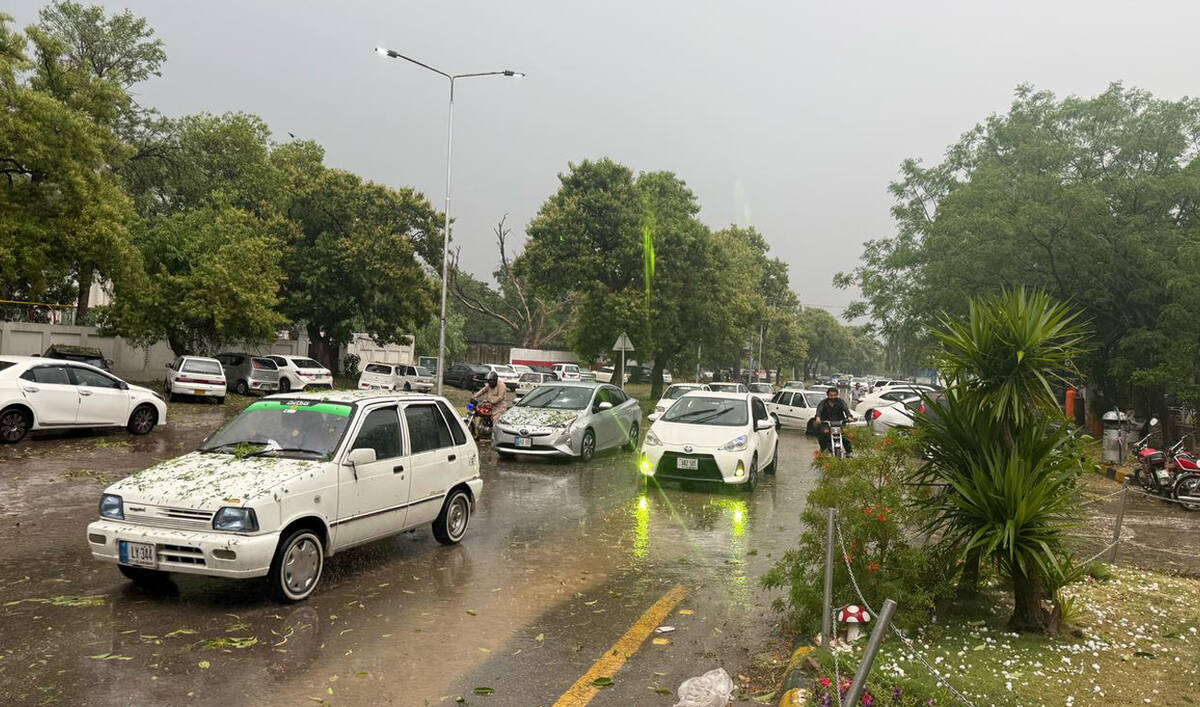ISLAMABAD: A pro-Palestine protester in Pakistan, who interrupted German Ambassador Alfred Grannas during his speech on civil liberties in South Asia at a rights conference in the eastern city of Lahore on Saturday, said he was ‘manhandled’ by the organizers who later forced him out of the hall.
Ali Abdullah Khan, who studies economics and is part of the Progressive Students Collective, disrupted the German envoy’s speech at the popular Asma Jahangir Conference while accusing the European state of “brutally abusing” those who have been agitating for Palestinian rights.
Germany has clearly sided with Israel since the beginning of the war in Gaza after a surprise attack was launched by Hamas on Oct. 7 as a response to the deteriorating Palestinian condition living under Israeli occupation.
The conflict, which has led to the killing of over 34,000 Palestinians, has led to widespread criticism of the Israeli government, leading to protests in different parts of the world.
While countries like South Africa have accused the Jewish state of committing genocide in Gaza, German authorities have forcibly removed protest encampments and gone into people’s houses to arrest them for critical social media posts on charges of antisemitism.
“We were forced out of the place after we raised our voice during the German ambassador’s speech,” Khan said while speaking to Arab News. “The organizers manhandled us and banned our entry in the conference.”
He said it was “baffling” to see the German ambassador “lecturing” people on civil liberties in Pakistan after his country supplied arms and ammunition to Israeli military to kill Palestinian civilians and destroy hospitals and education institutions.
“Germany isn’t in a position to champion civil liberties and human rights when it is complicit in the killing of thousands of civilians in Palestine,” he continued. “We simply called out Germany’s hypocrisy by peacefully raising our voice in the conference that literally agitated the ambassador.”

German Ambassador to Pakistan Alfred Grannas gestures during a speech at the Asma Jahangir Conference in Lahore on April 27, 2024. (Photo courtesy: X/@voicepkdotnet)
Khan said he had peacefully expressed solidarity with the people of Palestine and would continue to do so until the western world remained “complicit in the brutal massacre of Palestinians.”
The Asma Jahangir Conference is named after a late Pakistani human rights lawyer and activist and brings together scholars, activists, legal experts and policymakers to discuss a wide range of issues affecting the lives of marginalized communities.
Responding to an Arab News query, Munizae Jahangir, one of the conference’s organizers and the daughter of Asma Jahangir, objected to the way Khan criticized the German envoy.
“Freedom of speech is everybody’s right, but there should be a decent way to ask questions or express your difference of opinion,” she said. “The purpose of the conference is to provide a platform to people to express their opinions, views and dissent, but one should not insult people by shouting or getting harsh.”
Jahangir, a prominent journalist and activist in her own right, said a special session on Gaza was held at the conference to highlight the issue that was attended by Shawan Jabarin, director of the Palestinian human rights organization Al Haq, and Francesca Albanese, the United Nations Special Rapporteur on the Occupied Palestinian Territories.
“We warmly welcome the difference of opinion at our platform but not the insult and disrespect to our honorable guests,” she added.
Earlier, Khan interrupted the German ambassador shortly after he began his speech.
“I am shocked by the audacity that you are here to talk about civil rights while your country is brutally abusing the people speaking for the rights of the Palestinians,” he shouted while standing at the back of hall.
Many people around him supported him by shouting “Free, Free Palestine” and “From the River to the Sea.”
The German envoy, who looked visibly perturbed by the development, responded by shouting back at him and pointing to the exit.
“If you, if you want to shout, go out,” he said. “There you can shout. Because shouting is not a discussion.”
Last year in November, a Pakistani classical dancer and human rights activist Sheema Kermani raised slogans for a ceasefire at a British Deputy High Commission event in Karachi and later complained of being “escorted out.”


















